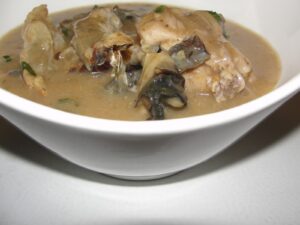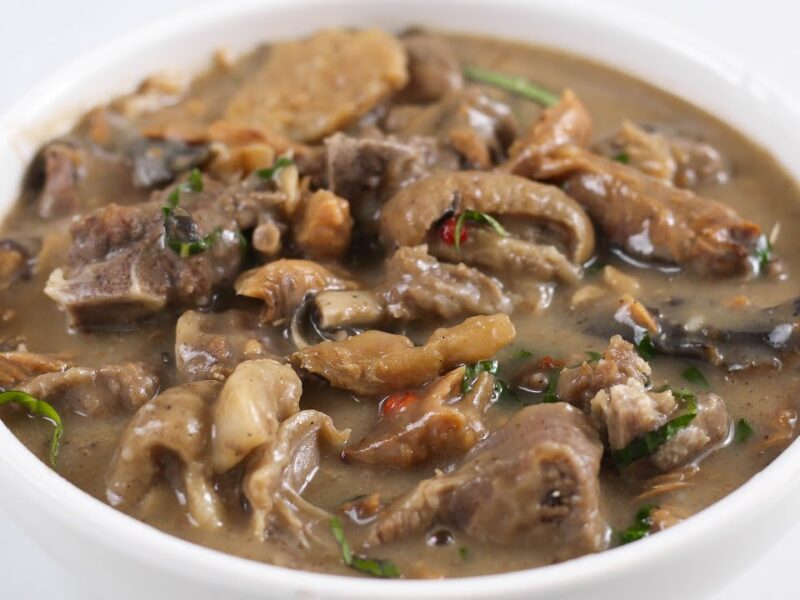Ofe Nsala or White Soup is a traditional Nigerian delicacy originating from the Igbo ethnic group. This aromatic and flavorful soup is typically prepared with a combination of assorted meats, fish, and traditional spices, creating a rich and satisfying dish that is enjoyed across Nigeria and beyond.
Nutritional Benefits of Ofe Nsala Soup
Protein
- Ofe Nsala soup contains a variety of protein sources, including assorted meats such as goat meat, chicken, beef, and fish.
- Protein is essential for muscle growth and repair, as well as overall body function.
- Consuming adequate protein helps support satiety, which may aid in weight management by promoting feelings of fullness.
Healthy Fats
- Palm nut extract or palm oil, commonly used in Ofe Nsala soup, provides healthy fats that are important for brain health, hormone production, and nutrient absorption.
- These fats also contain vitamin E, an antioxidant that helps protect cells from damage.
Vitamins and Minerals
- Assorted meats and fish in Ofe Nsala soup are rich in essential vitamins and minerals such as iron, zinc, vitamin B12, and omega-3 fatty acids.
- Iron is important for the formation of red blood cells and oxygen transport in the body, while zinc supports immune function and wound healing.
- Vitamin B12 is crucial for nerve function and DNA synthesis, and omega-3 fatty acids have anti-inflammatory properties and promote heart health.
Fibre
- Some variations of Ofe Nsala soup may include vegetables such as utazi leaves, which provide dietary fibre.
- Fiber is important for digestive health, as it helps promote regular bowel movements and prevents constipation.
- Additionally, fibre can help regulate blood sugar levels and lower cholesterol levels, reducing the risk of heart disease.
Antioxidants
- Certain spices and herbs used in Ofe Nsala soup, such as uziza seeds and utazi leaves, contain antioxidants that help protect cells from damage caused by free radicals.
- Antioxidants have been associated with a reduced risk of chronic diseases such as cancer, heart disease, and neurodegenerative disorders.
Hydration
- Ofe Nsala soup is typically prepared with water as the base, providing hydration to the body.
- Adequate hydration is essential for maintaining proper bodily functions, including temperature regulation, nutrient transport, and waste elimination.
Ingredients

- Assorted Meats: Common choices include goat meat, chicken, beef, or assorted offals such as tripe or cow feet.
- Fish: Fresh fish such as catfish or tilapia are often used in Ofe Nsala soup, adding depth of flavour and texture.
- Spices: Traditional spices such as uziza seeds, utazi leaves, and ehuru (African nutmeg) are essential for flavouring the soup.
- Stockfish: Dried stockfish adds a unique flavour and richness to the soup.
- Seasonings: Onions, garlic, ginger, and crayfish are commonly used to enhance the flavour of Ofensala soup.
- Palm Nut Extract: Palm nut extract or palm oil is used to give the soup its characteristic creamy texture and colour.
- Pepper: Fresh or dried peppers such as habanero or scotch bonnet peppers are added for heat and spiciness.
Preparation
- Prepare the Meats and Fish: Clean and cut the assorted meats and fish into bite-sized pieces. If using dried stockfish, soak it in water overnight to soften.
- Prepare the Spices: Grind the uziza seeds, utazi leaves, and ehuru (African nutmeg) into a fine powder using a mortar and pestle.
- Cooking the Soup: In a large pot, bring water to a boil and add the assorted meats and fish. Simmer until the meats are tender and cooked through.
- Add the Spices: Stir in the ground spices (uziza, utazi, and ehuru), chopped onions, garlic, ginger, and crayfish. Allow the flavours to meld together.
- Add Palm Nut Extract: Pour in the palm nut extract or palm oil, stirring well to incorporate. Adjust the consistency of the soup by adding more water if needed.
- Season to Taste: Season the soup with salt and pepper to taste, adjusting the seasoning as needed.
- Simmer and Serve: Allow the soup to simmer over low heat for an additional 15-20 minutes, allowing the flavours to develop. Serve hot with fufu, pounded yam, or rice.
Cultural Significance
Ofe Nsala soup holds cultural significance in Nigerian cuisine, particularly among the Igbo ethnic group. It is often served during special occasions and festive celebrations, such as weddings, festivals, and cultural ceremonies.
The rich and aromatic flavours of Ofe Nsala soup symbolize hospitality, togetherness, and community, making it a beloved dish that brings people together to share in the joys of food and fellowship.
Conclusion
Ofe Nsala soup, with its tantalizing blend of meats, fish, spices, and traditional flavours, is a cherished delicacy in Nigerian cuisine. Its preparation requires time, skill, and attention to detail, resulting in a dish that is rich, flavorful, and deeply satisfying.
Whether enjoyed during special occasions or as a comforting meal at home, Ofe Nsala soup represents the rich cultural heritage and culinary traditions of Nigeria, captivating the senses and bringing people together through the shared experience of food and culture.

